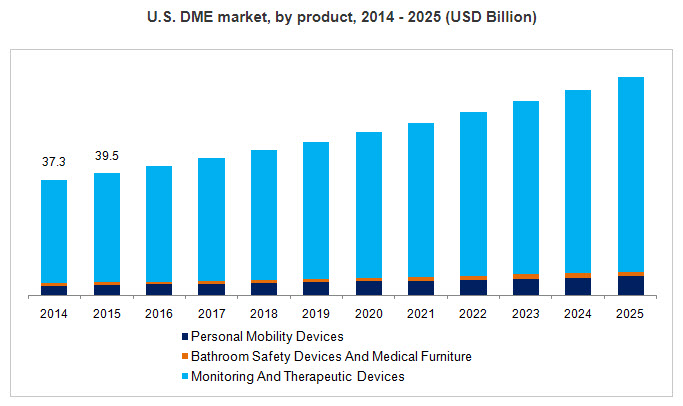Telemedicine’s Newest Threat. DME Denials?
A recent report from Grand View Research reveals a potentially hidden threat to telemedicine programs.
We’re all aware that chronic disease is a growing problem around the world, but did you know that the diabetic foot ulcer treatment market alone is valued at over $3.15 billion? Statistics like that mean the results of a report from Grand View Research should be no surprise.

Source: Grand View Research
We’re seeing a steady increase in the prevalence of not only diabetes but other chronic diseases and conditions, many of which require long-term care for patients and regular postoperative recovery — both of which are frequently monitored using telemedicine services.
Grand View’s research reports that DME growth will be seen in three areas:
- Personal Mobility Devices
- Bathroom Safety Devices and Medical Furniture
- Monitoring and Therapeutic Devices
Out of those three though, the lion’s share of growth falls into the last category.
Take blood glucose monitors for example. Remote diabetes monitoring has become a hallmark of telemedicine programs with glucose monitors being central to at-home monitoring and maintenance. Along with meters, pumps, and CGMs, denials of these services could be impacting the success of any telemedicine program at any stage of development.
DME for cancer treatment falls into a similar bucket. The WHO credits cancer with 13 percent of deaths worldwide and expects to see a 70 percent increase in new cases over the next 20 years or so. Tele-oncology has expanded cancer treatment and with it, the use of DME used in therapeutic and post-operative care.
What Should Technology Leadership Look Out For?
CTOs and hospital technology leadership invested in the health of telemedicine will need to develop and maintain insight into the effect that denials of DME used in their programs are having on patient outcomes and the overall success of their initiatives — some payors are already moving forward in getting the go-ahead for blanket denials of telemedicine equipment.
Business intelligence programs allow for the analysis of denied claim trends that can highlight threats to your program early on when mitigation is the most simple and least expensive. See how BI can identify these issues with an overview of Access Denial Intelligence today.